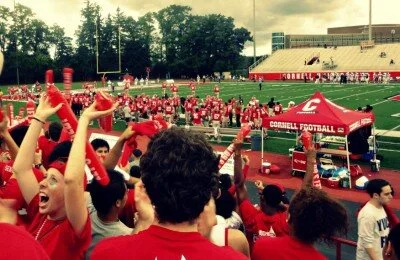Cornell Celebrates 150 Years
Author: Elani Cohen
The sesquicentennial marks the 150th anniversary of the charter that established Cornell University. It is a celebration of Cornell’s achievements through the university itself and its individual students and alumni. “There are so many reasons why we should celebrate Cornell. From its supportive, community-like atmosphere to the relationships that will last a lifetime, the Cornell experience is truly one-of-a-kind”, Emma Nagel ’17 comments. It is also a commemoration of the institution and a way to honor its heritage.
The history behind Cornell is quite intriguing, and something that Cornell students and alumni should know more about. Some key events in Cornell’s history are: April 27th 1865, when A.D. White and Ezra Cornell won the passage of the bill that charters Cornell as a land-grant educational institution for New York and the university is founded, October 7th 1868, when Cornell University—originally divided in two parts (the Division of Special Sciences and Arts, and the Division of Science, Literature, and the Arts)—opens and A.D. White becomes Cornell’s first president, 1909, when the graduate department became the graduate school, and 1933, when it was first referred to as an “ivy” in a New York Times article.
Sarah Peters ’15 exclaims, “I love Cornell because it’s gorges. It’s so pretty here: it just makes me happy.”
Cornell has also been the home of many achievements in many different disciplines. In 1881, Moises Coit Tyler became the first professor of American history in the United States and, decades later, Otto Kinkeldey became the first professor of musicology at an American university. Researchers at Cornell have developed some of the first cancer tests and led the way for environmental research. Alumni have won Pulitzer and Nobel Prizes, as well as the Stanley Cup and NHL MVP awards.
“I love feeling empowered by the peers, professors and community around me to achieve anything I put my mind to. It might sound cliche but I really feel like I can accomplish anything here” Alicia Glick ’17 adds. It is impossible to state all of the amazing contributions Cornell alumni have offered.
So how should you be celebrating the 150th anniversary of the amazing place we students are fortunate enough to call home? It is truly a year of celebration, with a number of events in America and throughout the world: this way, no matter where alumni are today, they can celebrate their Cornellian pride and the Cornell community can be united. The festivities started in September in New York City with the Empire State building glowing red and white in spirit of Cornell, moving on to Ithaca one month later for Homecoming celebrations. Upcoming events will take place alll around the world, from Washington D.C., Hong Kong, and Boston, to West Palm Beach, San Francisco, Los Angeles, and London. There will also be a huge celebration on April 24th-27th at Cornell. The celebration, also known as Charter Day weekend, will include a variety of events intended to commemorate the signing of the bill that established Cornell University’s charter in 1865 – ranging from famous alumni speakers like Bill Nye and Steve Squyres to a Gala Concert featuring Cornell’s chorus, glee club, and symphony orchestra.
Ezra Cornell wanted Cornell to be “… an institution where any person can find instruction in any study.” Throughout the past 150 years, Cornell has fulfilled this request by making many courses available to students who can and cannot afford the university. It is not only an institution of learning and knowledge, but has also become a second home for so many students and alumni. It is a place where students find themselves, get inspired, and learn how to achieve their dreams. Silvie Cohen ’14 adds, “Cornell is the most beautiful place on earth filled with the most beautiful people on the inside and out. Even the worst of days are the happiest of days at Cornell, because it is such a magical place.” Being a part of the Cornell community gives one a sense of pride that not all universities have. Once a Cornellian, always a Cornellian.






















Alyssa Phelps
Omg this is the best pi day article I've ever read. Kelly Webb, whoever you are, you're a ...
Roro
I don't know why my comment didn't show up here! Not only did I know gourmet study food, I...
Roro
We are so impressed at the gourmet way to study in this century!!!! In 1958 I got hot wate...
Mingna
I really lke what you are doing older brother!
Lisa
This is awful. I know for a fact that at least one person in this video didn't know it was...